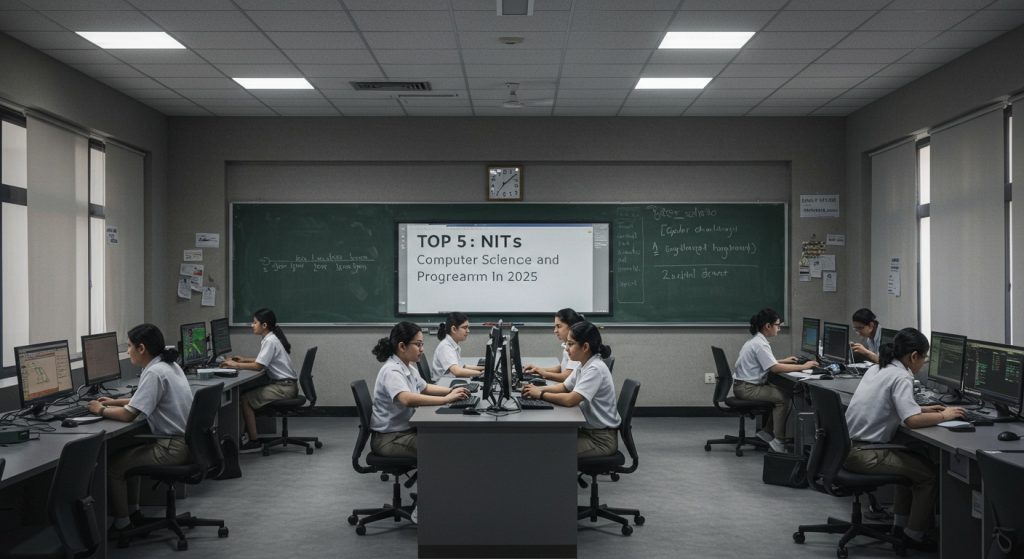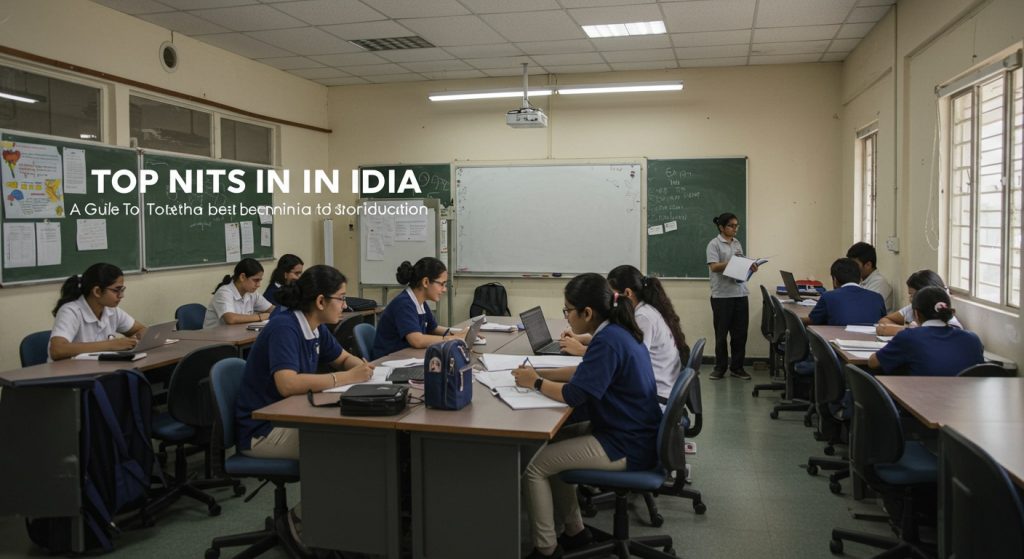The race to secure a coveted spot in a National Institute of Technology (NIT) for the 2025 academic year is already underway, demanding more than just rote memorization. Consider this: the evolving JEE Main syllabus now emphasizes application-based problem-solving, mirroring the shift towards practical engineering skills. Moreover, the increasing competition, fueled by the surge in online coaching platforms and readily available resources, necessitates a strategic and personalized approach. We’ll equip you with techniques to master time management, crucial for tackling the exam’s increasing complexity. Provide insights into leveraging AI-powered study tools for optimized learning. By understanding these trends and adopting a comprehensive strategy, you can navigate the challenges and maximize your chances of success in the NIT entrance exams.

Understanding the NIT Entrance Exams Landscape
National Institutes of Technology (NITs) are premier engineering and technology institutes in India. Gaining admission into one requires navigating a competitive landscape of entrance exams. The primary exam for entry into NITs is the JEE Main (Joint Entrance Examination Main). A good score in JEE Main is crucial, not just for securing a rank. Also because it serves as the qualifying exam for JEE Advanced, the gateway to the IITs.
JEE Main is conducted by the National Testing Agency (NTA). It assesses a candidate’s understanding of Physics, Chemistry. Mathematics based on the Class 11 and 12 syllabi. The exam is conducted in multiple sessions. The NTA score, which reflects percentile ranking, is used for admissions.
Beyond JEE Main, some NITs might consider scores from other state-level engineering entrance exams for a small percentage of seats. But, JEE Main remains the dominant and most essential pathway.
Crafting Your Personalized Study Plan
Success in NIT entrance exams hinges on a well-structured and personalized study plan. This isn’t about blindly following a timetable; it’s about understanding your strengths and weaknesses and tailoring your approach accordingly.
- Self-Assessment: Begin by honestly evaluating your proficiency in each subject (Physics, Chemistry. Mathematics). Identify topics where you are comfortable and those that require more attention. Take practice tests to get a baseline score.
- Time Allocation: Allocate study time based on the difficulty level of each subject and your proficiency. Don’t neglect weaker areas. Consistency is key. Aim for short, focused study sessions interspersed with breaks. The Pomodoro Technique can be beneficial.
- Resource Selection: Choose the right study materials. NCERT textbooks are fundamental. Supplement them with reference books for deeper understanding and problem-solving practice. Consider online resources like video lectures and practice platforms.
- Regular Evaluation: Regularly assess your progress through mock tests. Review your performance to identify areas for improvement. Focus on understanding concepts rather than rote learning.
Example: Let’s say you find Physics particularly challenging. Dedicate more time to Physics, breaking down complex topics into smaller, manageable chunks. Use visual aids, such as diagrams and videos, to enhance understanding. Practice numerical problems regularly.
Mastering Key Concepts and Problem-Solving Techniques
The NIT entrance exams emphasize conceptual clarity and problem-solving skills. Rote memorization is insufficient. You need to grasp the underlying principles and apply them to solve a variety of problems.
- Conceptual Understanding: Focus on understanding the “why” behind each concept, not just the “what.” Relate concepts to real-world examples to solidify your understanding.
- Problem-Solving Practice: Practice a wide range of problems, from basic to advanced. Start with solved examples to comprehend the approach, then move on to unsolved problems.
- Formula Application: interpret the derivation of formulas and their limitations. Don’t just memorize them. Practice applying formulas to different types of problems.
- Time Management: Develop time management skills to solve problems quickly and accurately. Practice solving problems under timed conditions.
For example, in Chemistry, instead of simply memorizing reactions, interpret the reaction mechanisms. This will help you predict the products of unfamiliar reactions. In Mathematics, practice different problem-solving techniques, such as substitution, elimination. Graphical methods.
Leveraging Mock Tests and Past Papers
Mock tests and past papers are invaluable tools for exam preparation. They simulate the actual exam environment and provide insights into the exam pattern, question types. Difficulty level.
- Simulate Exam Conditions: Take mock tests under timed conditions, simulating the actual exam environment. This will help you get accustomed to the pressure and manage your time effectively.
- assess Performance: After each mock test, assess your performance thoroughly. Identify your strengths and weaknesses. Focus on improving your accuracy and speed.
- Identify Patterns: assess past papers to identify frequently asked topics and question types. This will help you prioritize your study efforts.
- Evaluate Question Difficulty: Assess the difficulty level of different questions. Learn to identify and skip difficult questions during the exam to maximize your score.
Pro Tip: After attempting a mock test, don’t just check your score. Spend time analyzing the solutions to the questions you got wrong. Comprehend the concepts behind those questions and practice similar problems.
Effective Time Management During the Exam
Time management is critical during the exam. You need to allocate your time wisely to attempt all the questions within the given time limit.
- Prioritize Questions: Start with questions you are confident about. This will boost your confidence and help you manage your time effectively.
- Time Allocation: Allocate a specific amount of time to each section and question. Stick to your time allocation, even if you haven’t solved a particular question.
- Avoid Getting Stuck: If you get stuck on a question, don’t waste too much time on it. Move on to the next question and come back to it later if you have time.
- Review Answers: If you have time left at the end, review your answers to check for any errors.
Example: If you have 3 hours for the exam and 90 questions, allocate approximately 2 minutes per question. But, adjust this allocation based on the difficulty level of the questions. Spend less time on easy questions and more time on difficult ones.
Maintaining a Healthy Lifestyle and Mindset
Maintaining a healthy lifestyle and mindset is essential for effective exam preparation. Physical and mental well-being can significantly impact your focus, concentration. Overall performance.
- Adequate Sleep: Get at least 7-8 hours of sleep each night. Sleep deprivation can impair cognitive function and reduce your ability to concentrate.
- Healthy Diet: Eat a balanced diet rich in fruits, vegetables. Whole grains. Avoid processed foods, sugary drinks. Excessive caffeine.
- Regular Exercise: Engage in regular physical activity, such as walking, jogging, or yoga. Exercise can improve your mood, reduce stress. Boost your energy levels.
- Stress Management: Practice stress management techniques, such as meditation, deep breathing exercises, or spending time in nature.
- Positive Mindset: Maintain a positive attitude and believe in your ability to succeed. Surround yourself with supportive friends and family.
Remember, exam preparation is a marathon, not a sprint. Take regular breaks, stay hydrated. Avoid burnout.
Navigating JEE Main Counselling and Seat Allocation
After the JEE Main results are declared, the counselling process begins. This is a crucial step in securing admission to an NIT. The Joint Seat Allocation Authority (JoSAA) conducts the counselling process for admissions to NITs, IITs. Other participating institutes.
- Registration: Register for JoSAA counselling on the official website.
- Choice Filling: Fill in your preferred choices of institutes and branches in order of priority. Be realistic and consider your rank and the cutoff trends of previous years. Research the various NITs and their specializations.
- Mock Allotment: Participate in the mock allotment rounds to get an idea of your chances of getting a seat in your preferred institutes and branches.
- Seat Allotment: Based on your rank and choices, JoSAA will allot you a seat in one of the participating institutes.
- Reporting: If you are allotted a seat, you need to report to the allotted institute within the specified time period to confirm your admission.
It’s crucial to grasp the seat allocation process and the cutoff ranks of previous years to make informed choices. Consider factors such as location, faculty, infrastructure. Placement opportunities when choosing your preferred institutes and branches. For instance, if Computer Science is your passion, research which of the Top 5 NITs have the strongest CS programs.
Top 5 NITs: An Overview
While all NITs offer quality education, some consistently rank higher than others in terms of academic excellence, research output. Placement records. Here’s a brief overview of some of the Top 5 NITs, in no particular order, that are highly sought after by JEE Main aspirants:
- NIT Trichy (Tiruchirappalli): Known for its strong academic programs, excellent infrastructure. High placement rates, especially in core engineering branches.
- NIT Warangal: Renowned for its research-oriented environment, experienced faculty. Strong industry connections.
- NIT Surathkal (Mangalore): Located in a scenic coastal setting, NIT Surathkal is known for its innovative curriculum, focus on practical learning. Strong alumni network.
- NIT Rourkela: One of the oldest NITs in India, NIT Rourkela boasts a diverse range of academic programs, a vibrant campus life. A strong emphasis on research and development.
- MNIT Allahabad (Motilal Nehru National Institute of Technology): MNIT Allahabad is known for its well-structured curriculum, experienced faculty. Focus on interdisciplinary research.
These NITs consistently attract top talent and offer excellent opportunities for academic and professional growth. Research each NIT thoroughly to determine which one best aligns with your interests and career goals. Keep in mind that cutoff ranks vary each year, so aim to score as high as possible in JEE Main to increase your chances of securing a seat in your preferred NIT.
Conclusion
Your journey to acing the NIT entrance exams in 2025 doesn’t end here; it’s just beginning. Remember, understanding core concepts is paramount. Now, with the increasing emphasis on AI and automation (like we discussed in “Automation’s Impact on Future Jobs: What Skills Will Be Essential?”) , logical reasoning and problem-solving skills are more critical than ever. Personal tip: create flashcards for quick revision of formulas and key definitions. Beyond rote learning, actively engage with the material. Instead of passively reading, try teaching the concepts to a friend or family member. This solidifies your understanding and highlights any gaps in your knowledge. Consider attending online workshops focusing on exam-specific strategies; many are now incorporating AI-powered mock tests for personalized feedback. The key is consistent effort and strategic learning. Believe in your potential, adapt your strategy as needed. You’ll be well on your way to securing your seat at your dream NIT.
More Articles
Automation’s Impact on Future Jobs: What Skills Will Be Essential?
Top Programming Languages for Absolute Beginners in 2025: Your Guide
The Importance of Engineering Ethics: A Core Part of University Curriculum
Engineering Program Acceptance Rates: University Statistics You Should Know About
FAQs
So, what exactly is considered a ‘NIT Entrance Exam’ anyway? Are we talking JEE Main, or something else?
Good question! When we say ‘NIT Entrance Exams’ in this context, we’re primarily talking about JEE Main. That’s the big one that opens the door to the NITs (National Institutes of Technology). Passing it with a good rank is crucial for getting into your preferred NIT and program.
Okay, JEE Main. Got it. But how early should I REALLY start prepping for 2025 if I want to ace it?
Honestly? The earlier, the better. Ideally, if you’re in 11th grade, that’s a great time to start building a strong foundation. If you’re already in 12th and haven’t started, don’t panic! But buckle down and get organized – time is of the essence.
What’s the single most vital thing I should focus on when studying? Like, if I only have limited time…
If you’re pressed for time, prioritize understanding the core concepts. Rote memorization won’t cut it. JEE Main is all about application, so make sure you can actually use the formulas and theories you learn.
Everyone says ‘practice, practice, practice!’ but what kind of practice is most effective? Just solving any random problems?
Not just any random problems! Focus on solving previous years’ JEE Main papers. This will give you a feel for the exam pattern, the types of questions asked. The difficulty level. Also, practice mock tests regularly to simulate the actual exam environment.
Study materials – there are SO many! Any recommendations on which ones are actually worth my time?
NCERT textbooks are your best friend, seriously. They form the bedrock of the JEE Main syllabus. After mastering those, you can move on to more advanced books like H. C. Verma for Physics, R. D. Sharma for Maths. Organic Chemistry by Paula Yurkanis Bruice for Chemistry. But NCERT first!
Burnout is a real thing. How do I avoid it while still studying hard?
Absolutely! It’s crucial to schedule regular breaks. Don’t study for hours on end without a pause. Get enough sleep, eat healthy. Do something you enjoy outside of studying – whether it’s playing sports, listening to music, or hanging out with friends (responsibly, of course!). A healthy mind is a productive mind.
Should I join a coaching center? Is it absolutely necessary to crack JEE Main?
It depends on your learning style and self-discipline. Coaching centers can provide structured guidance, study materials. A competitive environment. But, many students successfully crack JEE Main through self-study with the help of online resources and good study habits. So, it’s not absolutely necessary. It can definitely be helpful for some.



